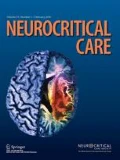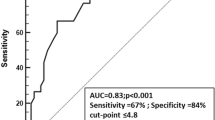Abstract
Introduction
Thromboembolic stroke is the most common severe complication following coil embolization of intracerebral aneurysms, with a 5% incidence of permanent deficits. Despite heparin anticoagulation, rescue therapy with the platelet glycoprotein IIb/IIIa receptor antagonist abciximab may be required. However, we describe a failure of abciximab rescue therapy and discuss the importance of monitoring the variable individual response to abciximab.
Case Reports
Two patients underwent stent-assisted cerebral aneurysm coil embolization complicated by thromboembolic stroke. In one patient, abciximab rescue therapy failed and was associated with a poor neurological outcome. Thromboelastography (TEG® model 5000; Haemoscope, Skokie, IL) and platelet aggregometry suggested inadequate platelet inhibition, although other tests of platelet function suggested adequate inhibition.
Conclusion
We describe a failure of regular-dose abciximab rescue therapy for thromboembolic stroke-complicating stent-assisted cerebral aneurysm coil embolization. The use of TEG to individualize abciximab dosing in this setting may improve patient outcome, as it tracks a pattern of coagulation consistent with the clinical picture.
Similar content being viewed by others
References
Vinuela F, Duckwiler G, Mawad M. Guglielmi detachable coil embolization of acute intracranial aneurysm: periperative anatomical and clinical outcome in 403 patients. J Neurosurg 1997;86:475–482.
Pelz DM, Lownie SP, Fox AJ. Thromboembolic events associated with the treatment of cerebral aneurysms with Guglielmi detachable coils. AJNR Am J Neuroradiol 1998;19:1541–1547.
Pruvo JP, Leclerc X, Ares GS, et al. Endovascular treatment of ruptured intracranial aneurysms. J Neurol 1999;246:244–249.
Schatz RA, Baim DS, Leon M, et al. Clinical experience with the Palmaz-Schatz coronary stent. Initial results of a multicenter study. Circulation 1991;83:148–161.
Topol EJ. Caveats about elective coronary stenting. N Engl J Med 1994;331:539–541.
Bertrand ME, Rupprecht HJ, Urban P, et al. Double-blind study of the safety of clopidogrel with and without a loading dose in combination with aspirin compared with ticlopidine in combination with aspirin after coronary stenting: the clopidogrel aspirin stent international cooperative study (CLASSICS). Circulation 2000; 102:624–629.
Lempert TE, Malek AM, Halbach VV, et al. Rescue treatment of acute parent vessel thrombosis with glycoprotein IIb/IIIa inhibitor during GDC coil embolization Stroke 1999;30:693–695.
Alexander MJ, Duckwiler GR, Gobin YP, Vinuela F. Management of intraprocedural arterial thrombus in cerebral aneurysm embolization with abciximab: technical case report. Neurosurgery 2002;50:899–901; discussion-2.
Muhlestein JB, Karagounis LA, Treehan S, Anderson JL. “Rescue” utilization of abciximab for the dissolution of coronary thrombus developing as a complication of coronary angioplasty. J Am Coll Cardiol 1997;30:1729–1734.
Gurbel PA, Bliden KP, Hiatt BL, O'Connor CM. Clopidogrel for coronary stenting: response variability, drug resistance, and the effect of pretreatment platelet reactivity. Circulation 2003;107:2908–2913.
Wheeler GL, Braden GA, Bray PF, et al. Reduced inhibition by abciximab in platelets with the P1A2 poly morphism. Am Heart J 2002;143:76–82.
Steinhubl SR, Talley JD, Braden GA, et al. Point-of-care measured platelet inhibition correlates with a reduced risk of an adverse cardiac event after percutaneous coronary intervention: results of the GOLD (AU-Assessing Ultegra) multicenter study. Circulation 2001;103:2572–2578.
Khurana S, Mattson JC, Westley S, et al. Monitoring platelet glycoprotein IIb/IIIa-fibrin interaction with tissue factor-activated thromboelastography. J Lab Clin Med 1997;130:401–411.
Coller BS. Monitoring platelet GP IIb/IIIa antagonist therapy. Circulation 1998;97:5–9.
Greilich PE, Alving BM, O'Neill KL, et al. A modified thrombo-elastographic method for monitoring c7E3 Fab in heparinized patients. Anesth Analg 1997;84:31–38.
Tuman KJ, McCarthy RJ, Djuric M, et al. Evaluation of coagulation during cardiopulmonary bypass with a heparinase-modified thromboelastographic assay. J Cardiothorac Vasc Anesth 1994;8:144–149.
O'Donnell J, Riddell A, Owens D, et al. Role of the Thrombelastograph as an adjunctive test in thrombophilia screening. Blood Coagul Fibrinolysis 2004;15:207–211.
Salooja N, Perry DJ. Thrombelastography. Blood Coagul Fibrinolysis 2001;12:327–337.
Author information
Authors and Affiliations
Corresponding author
Rights and permissions
About this article
Cite this article
Lombard, F.W., Welsby, I.J., Alexander, M.J. et al. Thromboelastography detects inadequate response to abciximab therapy during stent-assisted cerebral aneurysm coil embolization complicated by stroke. Neurocrit Care 4, 32–34 (2006). https://doi.org/10.1385/NCC:4:1:032
Issue Date:
DOI: https://doi.org/10.1385/NCC:4:1:032




